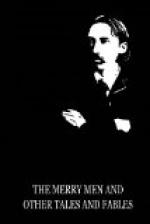|
This section contains 2,538 words (approx. 9 pages at 300 words per page) |

|
SOURCE: Eigner, Edwin M. “The House of God.” In Robert Louis Stevenson and the Romantic Tradition, pp. 126–33. Princeton: Princeton University Press, 1966.
In the following excerpt, Eigner discusses the Christian ethics expressed in “Markheim” in comparison to the Christian mores of the Russian writers Fedor Dostoevsky and Leo Tolstoy.
The idea we have just been considering, the theme of the disguised significant self, occurs elsewhere in Stevenson. There is, in fact, a regular disguise motif running through much of the early fiction, appearing in Prince Otto, in The Black Arrow, and in several of the stories from The New Arabian Nights. But it is not at all necessary in such works for the hero to begin, as Brodie does, with a belief in his essential depravity. Indeed, the title character of the story “Markheim” starts by denying that there is any evil at all in his real nature. Such...
|
This section contains 2,538 words (approx. 9 pages at 300 words per page) |

|


